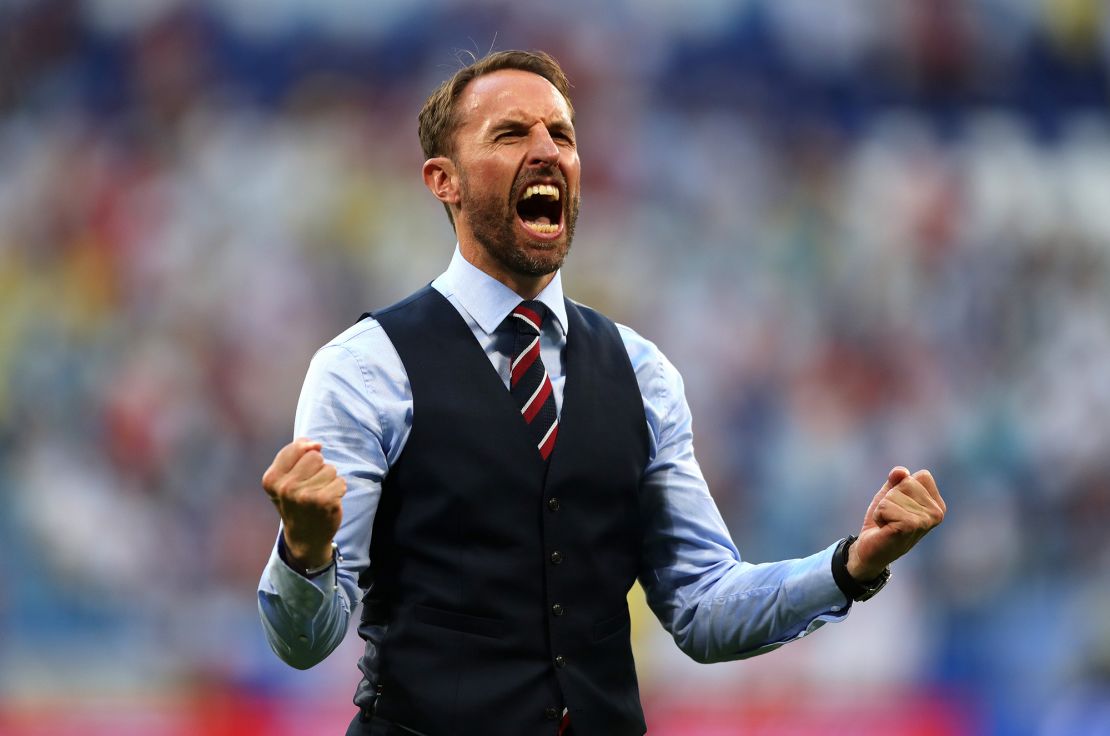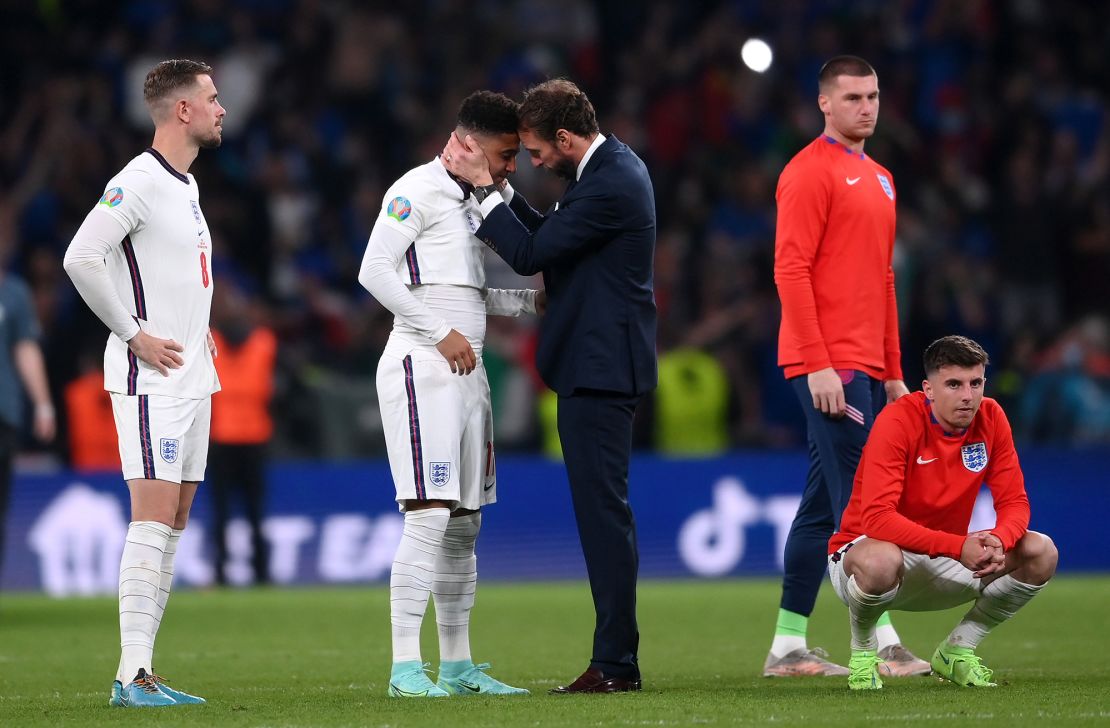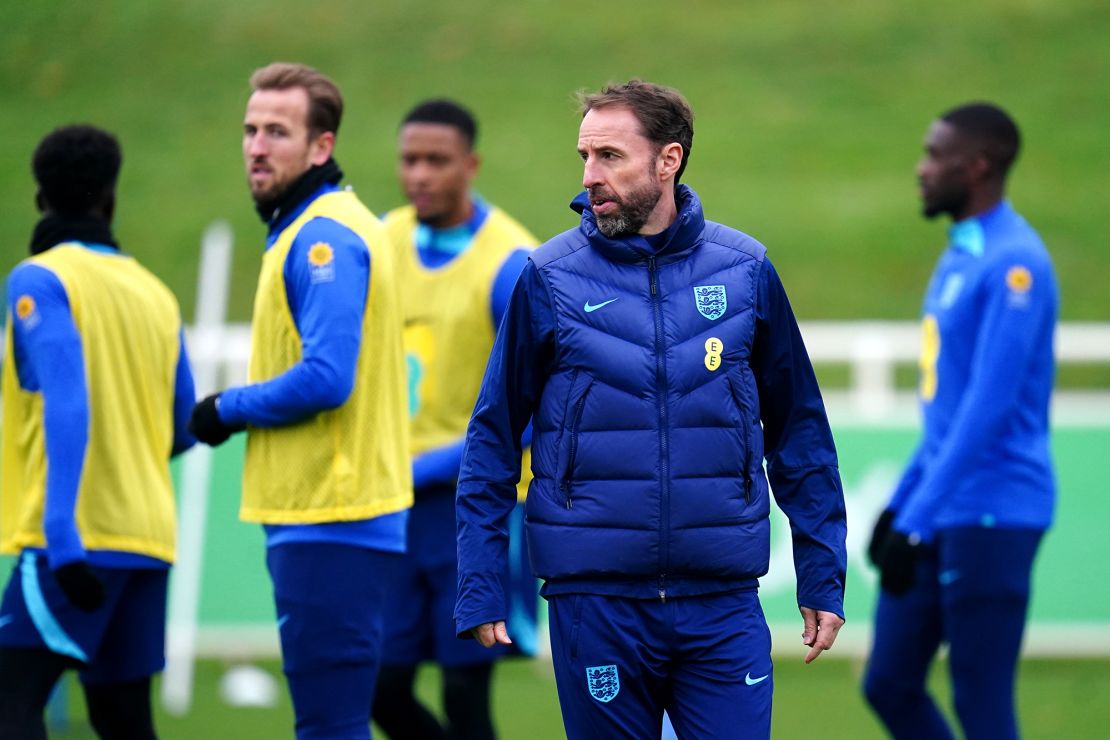Gareth Southgate knows what it’s like to feel pressure.
He’s felt the weight and expectation of a nation on his shoulders as both a player and a manager, so too the kaleidoscopic, bittersweet emotions and fine margins that are all entangled in the game of football.
And, as he prepares for his fourth and potentially final major tournament as England manager at this summer’s Euro 2024 in Germany, he also knows that history is ultimately written by the victors.
“The tournaments are what you’re in the role for. It’s ultimately where you’re judged and these are the opportunities to make history,” Southgate told CNN Sport’s Amanda Davies.
“Ultimately, we’ll be judged on whether we win this.”
So near, yet so far
Twice Southgate and his England team have been one page, one blot of ink away from writing their own names into the history books.
At first it was an unfancied, courageous march to the semifinals of the World Cup in 2018 only to be undone by the mastery of Luka Modri? and Croatia.
That run, though, won over the hearts and minds of a disillusioned footballing public at home and gave birth to an iconic waistcoat.

And then one heart-breaking step closer – a penalty shootout loss to Italy in the final of Euro 2020.
That defeat was met with sobering numbness on the one hand, plaudits for unwavering solidarity in the wake of online racist abuse towards some of England’s penalty takers on the other.
Ultimately, however, it was another case of what could have been. The wait for a major trophy for the men’s team goes on, 58 years of hurt since World Cup triumph in 1966.
‘Final step’
“Up to this point, I wouldn’t have said in Russia that was a realistic target given where the team had been,” said Southgate
“Of course, we got so close in the last Euros [….] We were one penalty away, one goal not conceded away from being European champions anyway. So, the players know how close we are.
“When you’ve been that close […] in the end, you need to take that final step.”
Germany in 2024 may well present the best chance to take that elusive final step.
Certainly, that is, if the bookmakers are to be believed.
England and 2018 world champion France currently lead the way with the host lingering in the background.

When asked whether it was indeed the best chance, Southgate replied: “It’s the next chance, so we’ll only know afterwards whether it was the best chance. Last chance saloon sounds desperado!
“This is a chance to come back, having made history or not. Simple as that.
“We know that we are one of the teams that can win the tournament, and we know it’s knockout football and anything can happen […] It’s about delivering in the key moments that matter.
“We’re comfortable with the expectation, particularly in England.
“Ultimately, people will judge it in a very binary way, but there’s a lot more wrapped up in that in terms of performance.”
Blessing or curse?
Despite his recent unparalleled success at major tournaments, Southgate has drawn criticism from some pundits and fans alike over his tactical approach.
Conversative, regressive, boring – those are just some of the tropes bandied about during his eight-year tenure in charge of the senior team.
All this is set against arguably the greatest abundance of raw talent and player depth the nation has ever had – from the craft of Trent Alexander-Arnold, the authority of Jude Bellingham and the wizardry of Phil Foden to the skilfulness of Bukayo Saka and the sharpshooting of Harry Kane.
So, are such riches at his disposal a blessing or a curse?
“Oh blessing,” insisted Southgate. “You’d rather have good players than not, that’s for sure.”
He then proceeded to lay out his case for the defence against the naysayers.
“Have we had some consistency in selection? I think we have. Have we given young players opportunities? I would say we have,” said the 53-year-old.
“We’ve relied on some regulars. That’s normally been in areas of the pitch where we don’t have the same competition for places […] and in a lot of those positions, they’re still the best players in those individual positions on the pitch that we have available.
“I have faith in what we’re doing. We know our players better than anybody else does […] And frankly, everybody else gets the same scrutiny anyway. So, it’s part and parcel of being a manager.”

Indeed, Southgate is no stranger at having to navigate the hostile dynamic that has often existed between the England team and the British media.
He was a saint in England’s march towards what many fans hoped would be European glory on home soil in 1996, then with the snap of a finger, immediately a sinner for missing a decisive penalty against Germany in the semifinals.
What followed was years of ridicule.
Strong leadership on and off the field built on the pillars of compassion, humility and sincerity has, though, gone a long way to shaking off that association and rebuilding the former defender’s image.
Surely, then, victory in Germany this summer would put a perfect bowtie on one of football’s great redemption stories?
“No, I don’t believe in fairy tales” said the self-effacing Southgate. “There are lots of examples where those things have been teed up and people have fallen just short.
“Don’t get me wrong, to beat Germany in the last Euros was an important moment for us. We hadn’t beaten Germany in a knockout game since 1966.
“When you’re the coach or the manager, it’s about your team and your plan is not about you.”
‘The decision will be mine’
And yet much of the speculation in the buildup to this summer’s tournament is around Southgate’s own future.
Although his existing contract expires in December 2024, England’s Football Association is reportedly keen to extend his tenure with The Three Lions through to the 2026 World Cup.
But the temptation of a return to club management may yet prove to be too strong with Manchester United rumored to be interested in acquiring his services.

The Englishman, though, is adamant that he and he alone will have the final say on where the next chapter in his career lies.
“It (the decision) will be mine,” he smiled. “Sitting here now I’m just completely focused on ‘How do we win this tournament?’
“It would be wrong to be thinking beyond that because, ultimately, I know what is needed to be achieved.
“When you’re on the cusp on a tournament like this then every hour you’re thinking about the team, nothing else.
“There are times where you sit there thinking, ‘I bet nobody else in the world is thinking about England at the moment’ but, of course, when the tournament comes, then everybody’s thinking about it.”
Despite being engulfed in the all-consuming world of overseeing the national team, Southgate remains conscious of his relative inexperience in management.
Prior to moving into the national set-up, he had only managed English club Middlesbrough for three years.
Following his sacking in October 2009 he spent four years in the wilderness before taking charge of the England Under-21 team in 2013.
He eventually made the step up to the senior team on a permanent basis in November 2016 having served as interim manager in the wake of Sam Allardyce’s resignation.
The possibilities that lie ahead of him are many and varied.
“It’s (club management) probably not something to consider at this time,” said Southgate. “I’ve got a big challenge ahead. (I’ve got) enough to think about over the next couple of months.
“The outcome of the tournament will determine everything. In terms of managerial experience, I’m still only 250 games because my journey has been different to a lot of other people.
“There’s a lot of life to live ahead of me and there are lots of experiences that I want to have in life generally. There’s also, I hope, plenty of time to do that.”


